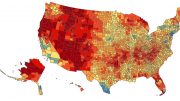
A recent study found that bisexual women are over three times more likely, and gay men and women twice as likely, to attempt suicide compared to heterosexual individuals. The research, based on survey data linked with health records for 123,000 people, emphasized a pressing need for improved mental health support within the LGBTQ+ community.
A recent study conducted by researchers at York University and ICES revealed that bisexual women are over three times more likely to attempt suicide than their heterosexual counterparts.
This groundbreaking research, which connects data from population-based surveys with health records of more than 123,000 individuals, also discovered that suicide-related behavior (SRB) events, both fatal and non-fatal, are twice as likely among gay men and lesbians compared to heterosexual individuals. These findings underscore the critical need for improved mental health support within the LGBTQ+ community.
“We wanted to better characterize the disparity in suicide-related behaviors across sexual orientations and gender,” says lead author Antony Chum, a Faculty of Health assistant professor and Canada Research Chair in Population Health Data Science at York University and adjunct scientist at ICES. “Prior research on suicide attempts has mostly relied on self-reported data from surveys, which means we don’t have information on people who are too sick to participate or have died by suicide.”
Published in the American Journal of Psychiatry, the study looked at Ontario participants from the Canadian Community Health Survey, which was linked to anonymous administrative health data such as emergency room visits or hospitalizations for non-fatal self-harm and fatal suicide events between 2002 and 2019.
The researchers, who include York University postdoctoral fellows Gabriel John Dusing and Chungah Kim, found:
- The overall prevalence of one or more SRB events was around two percent in heterosexual individuals, five percent in gay/lesbian individuals, and eight percent in bisexual individuals.
- Sexual minority individuals were at higher risk of SRB events, ranging from 2.10 to 4.23 times more likely when compared to heterosexual people.
- After adjusting for age and gender, the risk of a SRB event was more than three times greater among bisexual individuals, and this risk was most pronounced for bisexual women.
“The higher risk for bisexual women could be attributed to greater discrimination that bisexual people face within the LGBTQ+ community, as well as higher rates of violence, trauma, and caregiving burden that bisexual women may experience in opposite-sex relationships,” says Chum.
One limitation of the study is that data were not available for non-binary individuals and sexual orientations such as asexual and queer. Nevertheless, this was the first study to use a large representative sample linked with medical records, which improves the generalizability of the findings for other regions and populations.
“The study shows a clear need for better funding, policy, and programming to address LGBTQ+ suicide risk,” says Chum. “We also need increased training for healthcare workers to address LGBTQ+ suicide risk. Further, we want to encourage hospitals and clinics to collect sexual orientation data as part of routine patient care.”
Chum also notes the increasing creep of healthcare privatization and that publicly funded mental health supports need to be increased not just for LGBTQ+ people, but across the board.
Reference: “Disparities in Suicide-Related Behaviors Across Sexual Orientations by Gender: A Retrospective Cohort Study Using Linked Health Administrative Data” by Antony Chum, Ph.D., Chungah Kim, Ph.D., Andrew Nielsen, M.Sc., Gabriel John Dusing, Ph.D., Patricia O’Campo, Ph.D., Flora I. Matheson, Ph.D., Lucy Barker, M.D., Simone Vigod, M.D., Vicki Ling, M.Sc., Kinwah Fung, M.Sc. and Sidney Kennedy, M.D., 7 June 2023, American Journal of Psychiatry.
DOI: 10.1176/appi.ajp.20220763
The findings align with the authors’ related study published in March in PLOS One, which found that both sexual minority status and residing in under-resourced neighborhoods with poor access to healthcare, were independent risk factors for suicide-related behaviors. Future research needs to explore interventions that improve the mental health of LGBTQ+ people while addressing social determinants of health, such as neighborhood-level disparities and barriers to healthcare.









This was interesting at first, but is obviously a political agenda masquerading as science by wrapping itself in limited statistics. “The higher risk for bisexual women could be attributed to greater discrimination that bisexual people face within the LGBTQ+ community, as well as higher rates of violence, trauma, and caregiving burden” attributes risk to bisexuality itself, then attacks both this LGBTQ+ community and society at large for suicides without evidence. “Chum also notes the increasing creep of healthcare privatization and that publicly funded mental health supports need to be increased not just for LGBTQ+ people, but across the board” assumes that privatization is bad and increased public funding always improves outcomes; while these things are sometimes true, even the most ardent socialist with public healthcare (like Dr. Tony in Toronto) must still admit they are often false, especially considering this bisexual suicide evidence while the Canadian public healthcare system collapses. This aggressive agenda puts the statistics that I found interesting in question, making me trust the American Journal of Psychiatry as little as I now trust the American Psychological Association.
This is a real problem. Is more funding directed to questionable organizations and quasi-institutions going to make a dent in said problems?